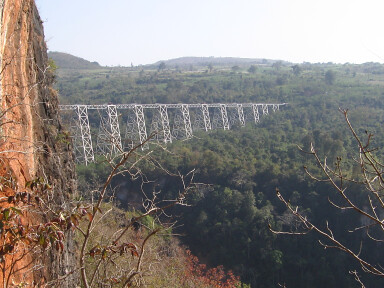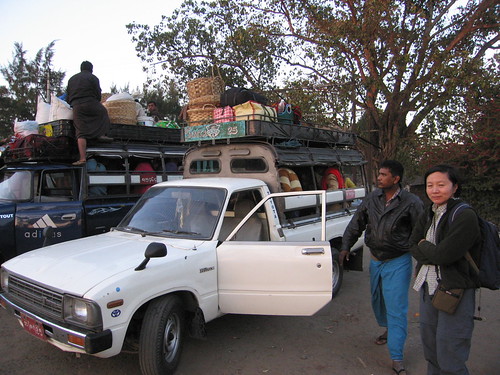Sun-Ling and John have been traveling the earth since 2008 while blogging, eating vegetarian and vegan, and riding public transportation. We love uphill day hikes, 20th-century architecture, Roman ruins, all bodies of water, local markets, shopping for groceries, aqueducts, miradors, trip planning, blablacar, and more.
Search This Blog
Thursday, December 25, 2008
Happy Holidays from Myitkyina, Myanmar (Burma)
At one time in 1944/45 the airport here in Myitikyina was the busiest in the world, flying supplies over The Hump to China.
http://en.wikipedia.org/wiki/Myitkyina
Many Christians here in town and I had a chance today to sing "Oh Come All Ye Faithful" with a local Baptist congregation but esacped just in time. haha
We are staying at the New Light Hotel, owned by a nice Sikh family. The showers are hot and the included b-fast is tasty.
Happy Holidays to all and the best 2009.
-john and sun-ling
Tuesday, December 16, 2008
Into Myanmar (UPDATED)
Our planned itinerary for the next week is Ruili to Bhamo by car; Bhamo to Katha by boat; Katha to Myitkyina by train. I will put some green pushpins on our Google Map for those three cities.
UPDATE: And a Happy Holiday Season to all our family and friends and readers!
Saturday, December 13, 2008
MSI
Overall the MSI Wind is awesome and we occasionally squabble over typing time as we have been able to find a hotel room with heat, hot water,and internet in almost every place we have stayed so far in China. We mainly use it for trip research(attractions, hotels, train schedules,etc.), checking the weather, keeping up with news and emails, storing photos, and blogging.
We also bought a GPS puck to use with the N800. That has turned out to be very cool. Know your altitude.
Here is a photo of Sun-Lin using the MSI in Kunming.
Friday, December 12, 2008
Southeast Asia
In the space of about 3 hours, on our bus ride from Xiaguan to Tengchong, we crossed first the Lan Cang Jiang (Mekong River) and then the Nu Jiang (Salween River) to effectively put us in Southeast Asia.
The Mekong is well known and we have encountered it many times in our travels at Ho Chi Minh City, Phnom Phen, Vientiane, and Jinhong; however, the Salween which is the longest undammed river in Southeast Asia was unknown to us before our trip to Myanmar last year.
The new expressway crossed the Salween then headed south along the western bank. After a few minutes we exited to the old road, continued along the river, then took a sharp right to head up and out of the gorge. On the way up we had views back to the impressive Nu Jiang Valley. Wow! Sorry, no photos from the bus window.
Here is a photo of us at Zhongtian Temple in Heshun Village, just outside of Tengchong in Yunnan Province , west of the Nu Jiang River. Lots of activity at the temple that day as it was the 15th of the lunar month.
Saturday, December 06, 2008
Dali
But we liked Dali anyway. Rented 2 bikes for the day for 15 RMB, just less than 2 USD. Had an awesome mushroom pizza today, and an awesome local hotpot last night. Bought a few souvenirs at reasonable prices, and rode the local bus yesterday to a bustling Market Day in Yousou, a Yi minority village just 45 kms from Dali.
I'm still behind on photos.
For Hunan photos click here.
For Guizhou photos click here.
And I've been keeping the Google Map updated. The red pushpin is our current location.
Friday, November 28, 2008
Riding the Hard Sell ..er..Seat
They work the car from one end to the other, sometimes two in one car, dropping a sample on each table, giving a loud and long pitch – it slices, it dices - then returning to pick up the sample and asking if you want to buy. They are annoying and rude, sometimes waking up sleeping passengers to ask “want one?” and targeting kids with trinkets and spinning glowing tops.
What’s the deal? We saw this selling on two different trains in the Hangzhou to Kunming corridor. Is it a new program to raise money for China Railways? The latex gloves were packaged as a CR product, complete with logo. Are the sellers regualr CR employees? Are they paid by commission?
As usual in China, none of the passengers complained about this loud and annoying practice, although our older seatmate did agree it was annoying and suspected that someone was paid off to let sellers on the train and thought that the uniforms were fake.
Selling the counterfeit bill detector.
Selling latex gloves.
Toothbrushes and Latex Gloves with Railway Logo
Saturday, November 22, 2008
Photos from Ningbo and Jiangxi
Friday, November 21, 2008
Where are they now?
Click on a line or pushpin in the map below to explore.
View Larger Map
Sunday, November 16, 2008
A Tiny World
Today I happened to sit next to a young sales manager from Huzhou population 2.7 million. He works for a company that makes a component for compact florescent light bulbs. His clients are bulb manufacturers whose products end up on shelves at Walmart, Home Depot, etc. His company is at 500 workers, down from 600 plus at the height. Sales are down 30%, $1.4M to $1M. Companies that rely mostly on US exports are struggling to stay in business at all, not to mention production cuts and layoffs. Restaurants that used to be frequented by local businessmen are hurting. Under the direction of their county manager, the whole county is keeping their eyes tuned to CCTV (State television) 2 which now reports on business news directly from Wall Street, as it had rarely done before. Everyone is holding their breath, hoping the downturn will be a short lived one.
My seatmate also told of a government bailout of a stuffed animal manufacturer in Guangdong that employed thousands of workers, paying back wages and placing workers in other sweatshops. This reminded me of a friend in Shanghai had mentioned that her aunt used to be a in partnership that made nylon flags and windsocks for export. The partnership is now folding and looking to invest into an organic farm.
The world has never been this tiny.
Saturday, November 08, 2008
Things work out
Before starting on our 6-month journey, we had a China-India-Myanmar visa relay. Unfortunately Hurricane Ike kept our passports in Houston for an extra 10 days. And after many desperate phone calls, hypothetical what-if's, and restless nights, we finally got back our passports back from the Myanmar Embassy 17 hours before we had to leave for the airport,
At the same time this global financial crisis is very unsettling for me. I have to remind myself, things work out.
Saturday, November 01, 2008
UPDATE
Several folks recently asked me about the route of the new Delta Airlines Shanghai/Atlanta flight. We took that flight - Shanghai to Atlanta - in May but I did not pay attention to the route. Yesterday we flew from Atlanta to Shanghai and I was paying attention to the onboard "moving map". Roughly,we headed north from Atlanta, crossed Michigan's Upper Peninsula and Canada's Northwest Territories, and then passed just north of Pruhdoe, Alaska before heading down through eastern Russia then in to China at Manchuria, passing west of Shenyang and over Beijing, and finally south east to Shanghai. The route in China stays way clear of North and South Korea.
The flight time for the Shanghai to Atlanta leg was about 16 hours - Sun-Ling watched 7 movies - and we arrived at Sun-Ling's parent's house in Shanghai roughly 23 hours after waking up at 4:00 AM in Raleigh. Not bad for traveling halfway around the world.
FYI: We both got one-year multiple entry Chinese visas.
Tuesday, October 14, 2008
Days 11 & 12 - January 16 &17, 2008 - Mandalay to Bagan
To make a long story short, the slow boat from Mandalay to Bagan took 36 hours instead of 15. We slept on the boat and made new friends among our fellow passengers and the crew.
Here is some video.
All the photos from the river trip are here.
Almost at Bagan, we look like we're having fun even though we spent 36 hrs on the boat and slept on the deck.
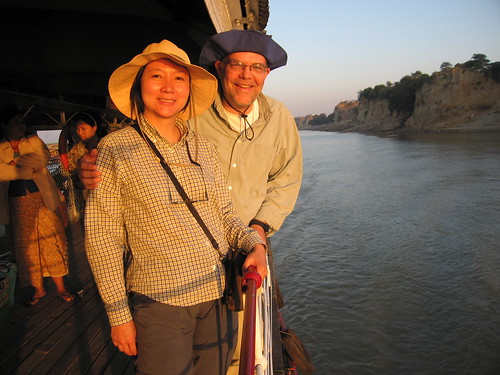
Monday, October 13, 2008
Day 10 - January 15, 2008 - Hsipaw to Pyin U Lwin
Sunday, October 12, 2008
Day 9 - January 14, 2008 - Hsipaw - Burma Road
Day 9 - January 14, 2008 - Hsipaw - The Burma Road
After a fine day of sight seeing in Hsipaw in which we were given oranges and cheroots (Burmese cigars) and invited to the wedding of Mr Food, we decided to head over across the river to catch the sunset view recommended in Lonely Planet. Seemed simple enough; we even confirmed the location with the folks at our guesthouse. Cross the bridge, take a right at the archway and walk up the hill to the Buddhist temples at the top.
However, it turns out that the bridge - over the Dokhtawady River - is on the Burma Road which goes from Mandalay to Kunming, China and there were many large trucks coming from China that can only proceed one at a time over the rickety, one lane, wooden plank bridge.
The sunset spot is in the "China direction" so we waited for 10 or 20 minutes before getting up enough nerve to cross the bridge on foot against the oncoming, one at a time, trucks.
Here's some video.
The sunset was amazing. There were two monks at the temple. One was of Chinese ancestry and spoke Mandarin. He had us sign the guest book; then brought us some tea. We chatted a bit, I smoked a cheroot, then the other monk came challenged him to a game of checkers.
Watched sunset and the sky turn orange, then purple. Walked back to Mr Charles Guesthouse.
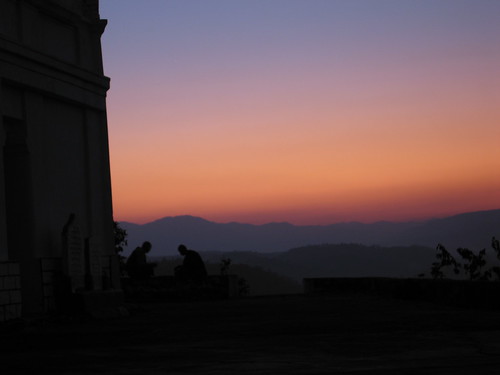
Check out this google map for more info.
View Larger Map
Wednesday, October 08, 2008
Day 8 - January 13, 2008 - Train to Hsipaw
Up @ 7:00 AM, ate b-fast, finished packing, and set off to the Pyin U Lwin Train Station in the hotel's van only to find out that the 8:50 train was at least 3hrs late. Bummer.
Back to the hotel. Sat on the veranda. Beautiful sunny day. Inquired about a shared car to Hsipaw; 28,000 Kyat total; too much; we will wait for the train and study our Myanmar guidebooks.
At noon we caught a ride back to the station from the hotel van. The ticket office finally opened at 12:50 or so, but when we tried to buy a ticket, the guys handling the foreigner's queue did not like our $10 bill - too dirty. But it was a ten given to us by the Royal Parkview Hotel as change when we paid our bill. It only had a few smudges of dirt.
Several other "officials" come round, look at the bill with kid gloves and declare "no bank will take this - too dirty".
So luckily I had the business card for the Royal Parkview stuck in my journal and while I guarded our bags, Sun-Ling went to the small market outside, found a phone, called the Parkview and demanded they send over some clean money. Agreed. And a guy arrived at 1:05 or so with a clean $5 bill and 5 ones. But we had received $50 in "dirty" money from the Royal Parkview , so we sent him back and 15 minutes later he returned with 4 clean tens. We traded bills with him, bought 2 First-Class tickets at $4 each, and got on the train at 1:25.
We had been in Myanmar for 8 days and had by chance used only very clean, new US $100 bills. Thus we did not know about the nationwide aversion to dirty foreign currency. We would be on top of it for the rest of our trip. Stay tuned.
So the train pulls out of Pyin U Lwin Station at 2:30 - almost 6 hours late. The train had 6 cars, 2 First-Class and 4 Ordinary-Class, pulled by diesel locomotive DF 1615.
Our First-Class car has opposing wooden benches and is maybe 50% full. There is a squat toilet at each end of car - no signage - that goes straight down to the tracks. There is no glass in the windows, just a metal grate that slides up and down.
We sat opposite a German couple for awhile. Then they moved.
I shot some photos and video of the landscape, two trains passing by in the opposite direction, and our fellow passengers as we lurched and rolled over the narrow gauge tracks headed mostly west but sometimes north and sometimes south.
Out the window we saw herds of cattle, a few goats, and people tending the fields.
Made several short stops and then at 4:45 parked at a small station. After 15 minutes and no motion, I pulled journal and noted the local children were selling water from a pail, young monks were quietly watching, and that none of the kids were begging, just shyly waving at us.
As we sat and sat, I began to wonder if we would pass over the famous Gokteik Viaduct in the dark. That would be a bummer as it's an engineering marvel at 320 feet high and 2250 feet long, built in 1899 by the Pennsylvania Steel Company.
The sun set, went down, and we finally pulled out at 6:30. Now it was cold. We put on all of our outer gear including rain pants. We make friends with Sandy across the aisle, an American, who visiting Myanmar for the 5th time. She is taking the train to Hsipaw just to see the Gokteik Viaduct as she has previously been to Hsipaw, but not by train.
After a brief stop, we go over the GokTeik Viaduct. Not much to see in the dark.
Then stopped in Kyauk Me Town. The German couple has had enough and get off with a tout who owns a guesthouse in town - he leaves me his card.
Finally, at 11:15 we arrive in Hsipaw. There is no announcement, no nothing, and so we inadvertently get off on the wrong side of the train. After scrambling back to the correct side we head off with Sandy with our flashlights down a dirt path towards town.
It's pitch black, there are no signs, but with the help of a nice man on a motorbike we arrive at Mr Charles Guesthouse and for $15 get a double room. Crash.
Passing a freight train.
Fellow passengers stretch out.
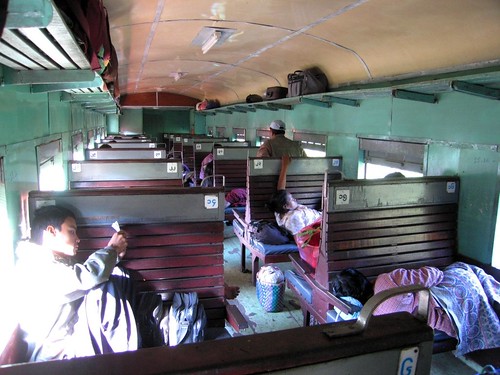
Water seller.
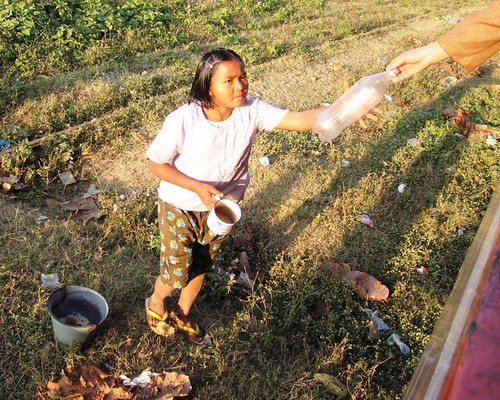
Crossing the Gokteik Viaduct at night.
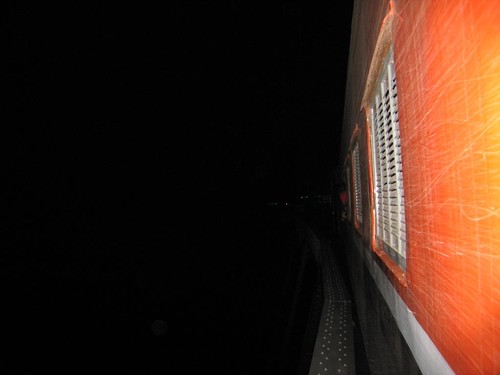
Tuesday, October 07, 2008
Reflections on a summer at home
- I lived the life a hermit. It was as if being home is an antidote for being on the road where we encountered the unfamiliar, were exposed to the elements, and subjected to the unpredictable. Most days this summer we stayed at home by ourselves, working on our house, studying and reading, and surfing on the Internet. Granted we did spend a whole month, in total, visiting family and friends out of town although we still have not managed to see all our friends around town. Before, we were always out doing things and getting together with friends....
- The Danish word Hygge (hu-gah) is a feeling or mood that comes from taking genuine pleasure in making ordinary everyday things simply extraordinary. It's about owning things you only truly love or that inspire, being present in yourself and your life, putting effort into your home without being Martha Stewart or buying a bed in a bag. Words like cosiness, security, familiarity, comfort, reassurance, fellowship, simpleness and living well are often used to describe the idea of Hygge. -- Alex Beauchamp.
I found hygge - word I learned in Copenhagen - at home. Before, we spent our vacations traveling and our holidays visiting family. We were never around home enough, let alone hygge. This summer John and I both had lots of projects around the house, both big and small. Now I walk around the house feeling peace rather than anxiety.
The hallway.
Our corner desk.
Making yogurt.
Friday, October 03, 2008
Day 7 - January 12, 2008 - Pyin U Lwin Walking Tour
Up at 8:30 after a very good night's sleep. No heat in our room but the inside temperature only got down to 15 C.
Had breakfast outside in the sun (jackets on): 8 pieces of bread with butter and jam + good coffee w/hot milk + fresh pineapple juice + fried eggs.
Spent the rest of the morning relaxing on the veranda and studying Bagan and other parts of Burma. Since we are out for 6 months, we don't need to go-go-go every day like we used to when all we had was our yearly 3-week trip.
Had the front desk make a reservation for us on tomorrow's morning train - 8:05 AM - to Hsipaw (Thipaw).
Left for some sight seeing at noon. First stop is Candacraig, the Colonial Era Hotel built in 1904 and famous from Paul Theroux's books The Great Railway Bazaar and Ghost Train to the Eastern Star. Not many rooms. Well maintained lawn with tennis court.
Then over to the Chan Tak Chinese Temple which is both Buddhist Temple and old folks home. Sun-Ling chatted up 2 old men who came to Pyin U Lwin from Yunnan China in the 1950's as small boys to escape troubles. We sat, talked, and drank tea.
The temple had a mix of Chinese Buddhist tradition like the Laughing Buddha, and Kuan Yin, and Burmese Architecture. There were some interesting paintings around the inside top of the main temple building, the likes of which I had never seen in a Chinese Buddhist Temple, but we did not take the time to study them or ask questions, but they show up in my photos (see below). Wish I had asked some questions.
Walked up to the top of the pagoda for some photos, then over to the vegetarian canteen (snack bar) for some lunch: cold thick bean noodles with spicy sauce + vegetarian chicken + fried bean flour @ 1000 Kyat. The one old man from earlier ate with us and said that the temple is building a vegetarian restaurant next door to the canteen. Two young kids who spoke very good Chinese delivered our food and we learned how to say "vegetarian food" in Burmese: "duh-duh-loo".
Then on to explore the Main or Central Market. Sun-Ling said it seemed that 90% of all business (and businesses) in Pyin U Lwin was in this Market. "It's size and selection is not seen anywhere. You can buy everything there." She meant "everything" available in PYin U Lwin was available here - food, rice, textiles, baskets, sugar, packaged food, watering cans, etc., etc., - spread over several buildings and joining sheds with night food stands that set up after 4PM. There were not many other stores in town although there was a Safeway (with the usual logo).
We bought: bean & peanut dry mix + 6 oranges + peanuts + bread; all for 2000 Kyat.
Toured downtown area: Purcell Tower, an antique barber shop, the Art Deco Yuzana and Myoma cinemas, a Mosque, several Chinese Restaurants, and the former National Press building. Bought more snacks and tried to buy a souvenir at Soe Moe but no deal.
Back to Golden Triangle: papaya juice + 2 x 8-inch veggie pizzas + cookie to go @ 5650 Kyat.
Back to hotel.
SLHOTD: Reading and studying Bagan on veranda.
JHOTD: Art Deco Cinemas.
Candacraig.
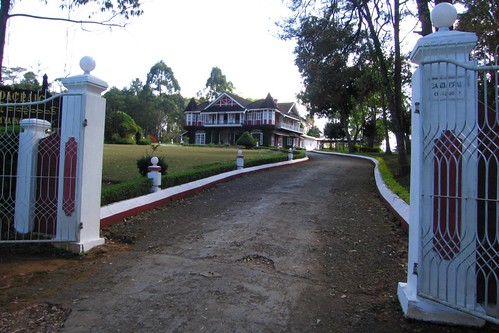
Sun-Ling chatting with man at Chan Tak Buddhist Temple.
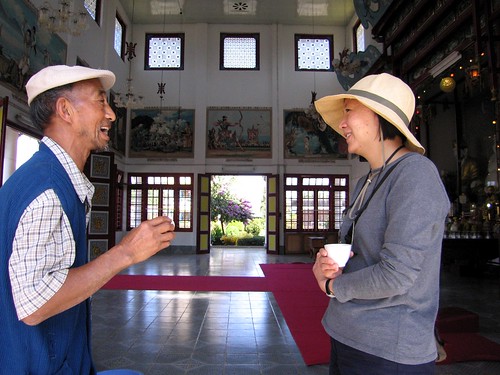
Chinese Buddhist images.
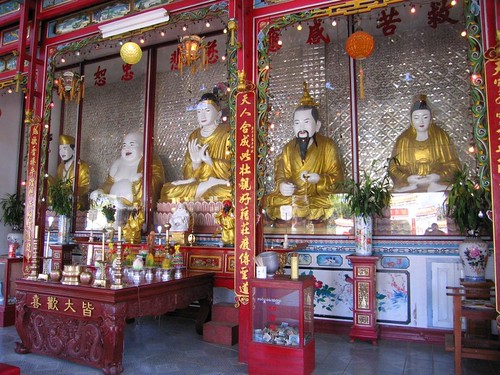
The very cool Art Deco Yuzana Cinema.
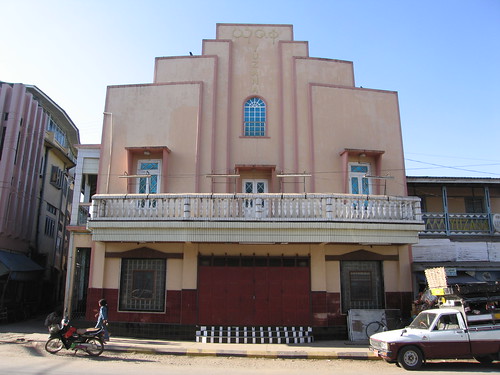
Downtown with a traditional horse cart at right.
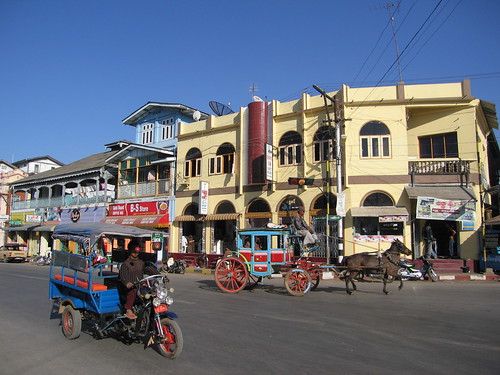
Bicycle Restaurant - Food Cart.

Market: Watering cans, stoves, etc
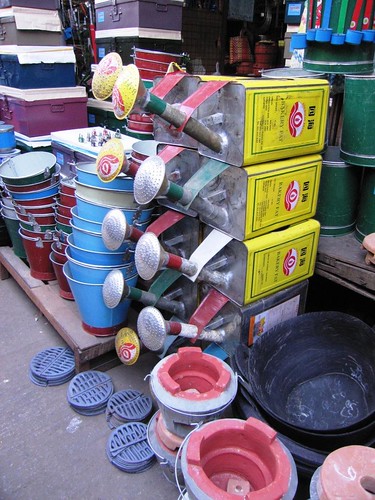
We bought some snacks from this lady. You can just make out Sun-Ling at left. And check out her yellow longyi with palm trees. Cool!
Wednesday, October 01, 2008
Day 6 - January 11, 2008 - Mandalay to Pyin U Lwin
To and Around Pyin U Lwin (pronounced like "pying oo lwing")
Up at 6:45 and downstairs for b-fast @ 7:05: bananas, toast, juice, fried eggs, and coffee.
Finished packing, brushed teeth, toilet, etc., and checked out @ 7:55. Paid bill of $95 (US Dollars) for the room and 100 kyat for a phone call and 14,000 kyat (about $6 each) for the shared taxi to Pyin U Lwin. We paid the hotel for the shared taxi. Not sure how money gets to the driver or his company.
The Shared Taxi is a Toyota Corolla Wagon with right-hand-side steering - guess it came from Japan - even though Myanmar drives on the right side (left-hand-side steering wheel). Made a pickup east of Mandalay Palace - a woman and two, small, very well behaved children.
Gassed up on the outskirts of town after driving through some typical third-world rush hour traffic; lots of bicycles and motorbikes, all going in to Mandalay as we were headed out east on the main road into town.
The gas-up was novel to say the least. Gasoline is poured into a gallon container set on a stand. The container has a filter - like a big coffee filter - and gravity does the rest. Take a look at this video.
The ride to Pyin U Lwin - a former British Hill Station named Maymyo - took about 1.5 hours; slowly uphill at first, then a section of switch backs, some rolling hills, then a few more switchbacks, then into town. The roads were good, not 100% smooth, but no potholes and with a decent shoulder. For the switchback sections there was actually two distinct roads; one for uphill, one for downhill, separated by a huge natural "median". Very safe. We followed another shared taxi most of the way whose driver paid the 3 tolls for both vehicles. Two of the "tolls" were just a guy in the road next to a shed, but one was a real tollbooth with gates and an LED sign that said 100 Ks as we passed. Sun-Ling listened to music stored on her cell phone while I watched the driver and the scenery.
As the steering wheel is on the right-hand side, the driver has to be especially cautious - and ours was - while overtaking traffic on a two-lane road. We passed tanker trucks, bullock carts with hay, and school kids walking or biking. Entered Pyin U Lwin, dropped off the woman and kids, and after passing a golf course, we were dropped off at the Royal View Hotel.
Now, for a very detailed description of our room, #201 at Royal Parkview Hotel No. 107 Lanthaya St Pyin Oo Lwin, Myanmar Ph 085-22641 / 21905 email: r_parkview@myanmar.com.mn #201 is a Standard Room The normal price in $30 US for a double (breakfast included). They offered $28 as a discount, we countered with $25 which was accepted. Maybe we could have gotten $20 as we appeared to be the only people in the place - well there was one set of golf clubs on the veranda so maybe there is one other person. [They also have Deluxe Rooms with bathtubs.] Room #201 has
- Wood floors and a high ceiling
- Twin beds with crispy clean sheets, extra blankets and a night stand between them
- TV with ESPN and Cinemax plus Myanmar channels
- Writing desk w/light and chair - very nice
- Wardrobe, fridge, ceiling fan, and wall exhaust fan
- 2 sitting chairs and a small table
- Large bathroom with shower only, nice sink, western toilet, and very luxurious white bath towels and hand towels
- Hot water in thermos, loose tea in plastic bags, and 3-in-1 coffe mix
- Complementary apples
- Flip-flips and minibar
- Small veranda outside by the front door
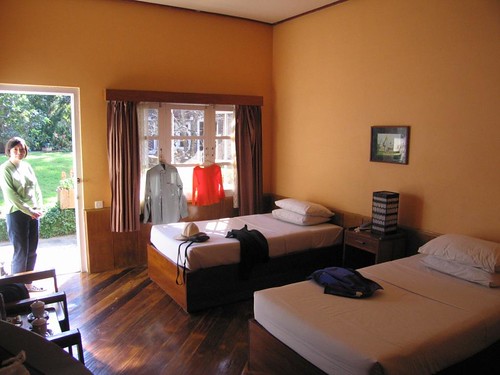
It's definitely cooler in Pyin Oo Lwin than Mandalay. You want to be sitting in the sun in the mornings with long sleeves, long pants and jacket to ward off the chill. Set out at 11:30 or so to explore town using the map given to us by the nice English speaking young lady at the front desk. She marked the Main Market and the Golden Triangle Bakery (run by Americans). The RPV hotel is on the south end of town - at least a 30 minute walk from downtown - but Sun-Ling observed that it really had the Hill Station vibe; that is, laid back, quiet, and good service.
Walked to the Market, passing some Colonial buildings. A beautiful walk; sunny, just a few clouds, and 70 F. Continued through the market, made a wrong turn, but bought 6 samosa and fried dough w/filling from a local shop. Then headed east to Mandalay Road and finally found the Golden Triangle Bakery. The menu was Coffee, Pizza, Pastries, Juice, etc. Bought a baguette and Danish for 700 Kyat. Oh, the samosas had already been devoured. Later, when we ate the Danish, Sun-Ling suspected that it was made from goat butter as it was buttery and not too sweet.
Left Golden Tri at 12:35 and made it back to RPH at 1:00 Pm - longer walk than expected. Grabbed our swim gear, water, flashlights, towels, extra shirts, guidebooks and headed south on foot - 45 minutes - to the National Kandawgyi Botanical Gardens: admission $4 US per person plus 1000 Kyat camera fee. It's a very, very, nice, beautiful, well-maintained botanical garden, built in the early 20th Century. Right inside the entrance is an L-shaped swimming pool that did not look inviting enough for a dip at 70 F. At 20 degrees hotter I would have been in. Spent almost 4 hrs in the gardens. Highlights:
- Eating our Danish by the lake
- The Orchid Garden
- Pagoda Pond with swans
- Arranged tulips and cymbidiums
- All the lakes
- Blue delphiniums
- Red and yellow poinsettias trees
- Rain Forrest elevated walk (5 meters high)
- Seeing an elephant
- Aviary with Great Hornbill
- Rock garden and swamp garden
- Bamboo groves
- Fishtail Palm Tree
SLHOTD: Great Hornbills kissing (John has video to prove it)
JHOTD: Gassing up
The Market
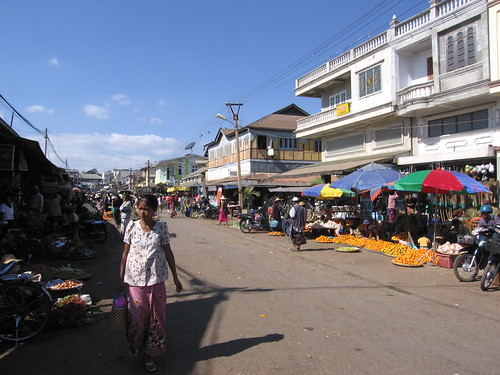
Colonial Era Church
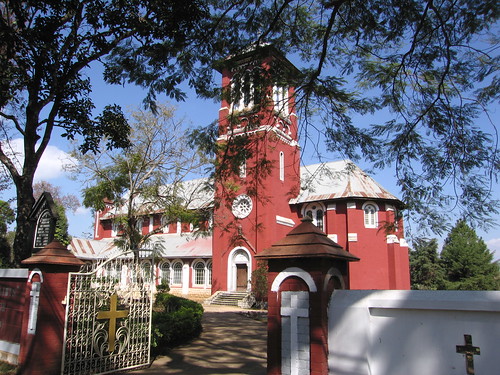
Relaxing at the National Botanical Gardens.
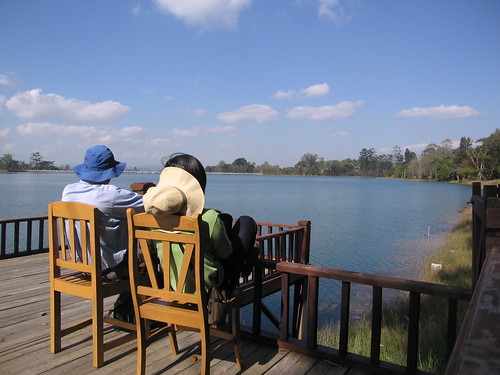
More of the Botanical Gardens.
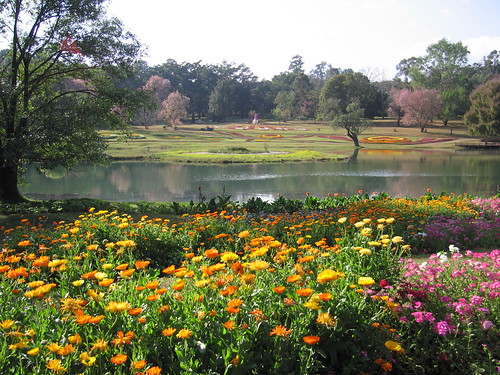
The Great Hornbill (photo now - video to be inserted later).
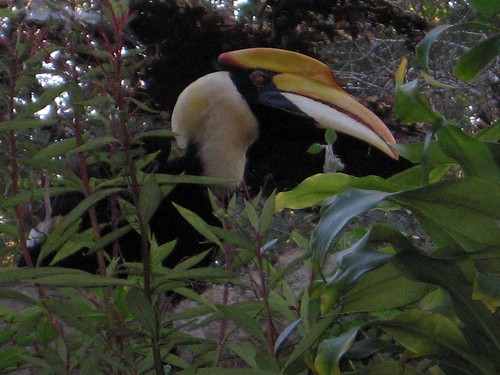
Monday, September 29, 2008
Day 5 - January 10, 2008 - Mandalay, Myanmar
Ancient Cities of Mandalay
Up at 7:05 and downstairs for b-fast @ 7:35.
Hopped in the arranged Blue Mazda Taxi (at 19,000 Kyat for the whole day) just after 8:00 AM for a trip to three of the nearby ancient cities: Sagaing, Inwa, and Amarapura.
The ride out of Mandalay was cool. We sat in the almost open bed of the small pickup. Lots of commuters. Monks on there alms collecting missions hanging out of the back of larger pickups.
Followed the railroad tracks for awhile before making our first stop across the Irrawaddy River from Sagaing Hill. Then across the so-called New Ava Bridge (circa 2005/06) to Sagaing Hill.
The stairs were covered but the climb was a lot shorter than yesterday's ascent of Mandalay Hill. A bit hazy but some views from the tiled top. Attendance: light. We were not asked to show the combo ticket so no stamp. ;-(
Then 10km north to Khaungmudaw Paya with its spectacular, blinding white, breast-shaped stupa. There were a good number of tourists and pilgrims and vendors, and some shady spots were one could relax and admire the splendid symmetrical stupa. Sun-Ling commented that it was a "middle class" stupa; school kids on field trips and women buying thanaka.
Over to Hsinmyashin Paya (Temple of Many Elephants) with its famous elephant motif. Slow; several workers eating lunch and a couple of meditaters. So a quick stroll around and on to nearby Sagaing Market for lunch.
Tried two places. The first was too expensive, the second too meaty. So we picked up some snacks from a Chinese grocery (no Chinese spoken; family run business, the son spoke some English) and a bakery. Spent about 1200 Kyat total.
Back in the blue taxi, we headed back across the Irrawaddy River, this time on the Old Ava Bridge which is one lane for vehicles in each direction with a center "lane" for trains. Super cool!Of course a train went by just after I put my camera away so I barely got a photo. But I did shoot some video (see below).
Turned down the junction road to Inwa Ferry. It's 1000 Kyat each for a return ticket. The ticker seller whistled and the ferry with its surly captain and a shifty mate came over from the opposite bank. Back and forth. Back and forth. Guess that might make me surly and shifty.
At Inwa (Ava) Island landing, there were about 30 to 40 horse carts waiting to take tourist around. 4000 Kyat was the going rate for a three-stop tour: old teak monastery, the watch tower, and the new masonry monastery. Tried to bargain down but no deal. Good for them!
Very cool to take the horse cart over the bumpy and dusty dirt roads in the manner of a Jane Austen novel. When passing through a village, the local kids would run along waving "bye-bye".
Ate our snacks at the old teak, ship-like, Bagaya Kyaung Monastery. It's still in use as a school for very young children; not restored, and nifty.
Back in the horse cart, I switched to the front seat as sitting in back was making me queasy. Passed through one of old city gates on our way to the Watch Tower (Nan Myint) - Inwa (Ava), MyanmarWatch Tower. Good view back to Sagaing Hill, Old Ava bridge, and the Khaungmudaw breast. At the tower, Sun-Ling bought a painting - one of the few souvenirs we would buy on the entire 5-month trip - for 4000 Kyat. It's now installed at our home.
Third Stop is the Maha Aung Mye Bonzan Monastery. Masonry. Yellow. So-so. Back to ferry. Across. On to Amarapura.
I get lucky with the train: On the way to Amarapura we got stopped at a RR crossing and I jumped out in time to catch some video of the rolling, narrow gauge passenger train come through. I even got a wave.
Then to the Chinese Temple, a Guan Yin Temple much like any other Chinese Temple in Asia. Sun-Ling is 99% sure that it is now a nunnery or has lots of nuns who were cooking and eating while we were there... and ignored us.
Then onto a nearby temple - not not catch the name - to see the large seated outdoor Buddha, a reclining Buddha, adn a large owl. The younger monks were playing a vigorous game of football;"no photos" they said, while the older monks are playing cards and drinking tea.
Then on to the famous U Bein Teak Bridge. The world's longest teak bridge with lots of local color - monks, local visitors and tourists - but also loads of touts and vendors, boats for rent, blind musicians, owls and hawks to pose with, and restaurants. Bought some cold bean noodle soup - 500Kyat - too much.
There was a local guy on the bridge with a bike who was posing for 2 tourists (or professional photographers) who were down on the bank; and some tour groups were out on Taungthaman Lake in boats to watch the sun set.
The sun sank lower, the lake turned yellow, then orange, and things quieted down as we reached the far end of the bridge. Took a ton of photos.
Back to the truck, and back to the hotel in heavy rush hour traffic. I almost bounced out of the back of the pickup at one point. Crazy!
Hot shower and then out for Chinese noodles and fried rice at a small joint across from the Hospital @ 1600 Kyat total.
Back to the hotel and packed for tomorrow's trip to Pyin U Lwin Hill Station.
SLHOTD: Horse cart ride and Khaungmudaw Paya.
JHOTD: RR crossing video.
The morning commute as seen from the back of our pickup truck taxi.
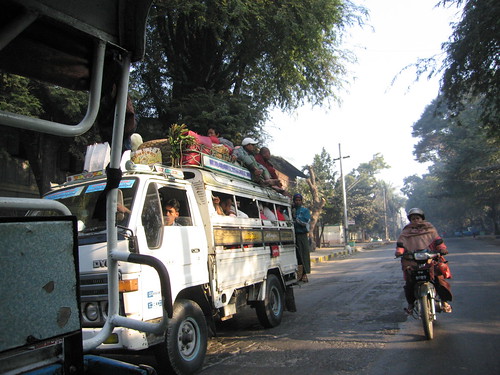
The dazzling Khaungmudaw Paya.
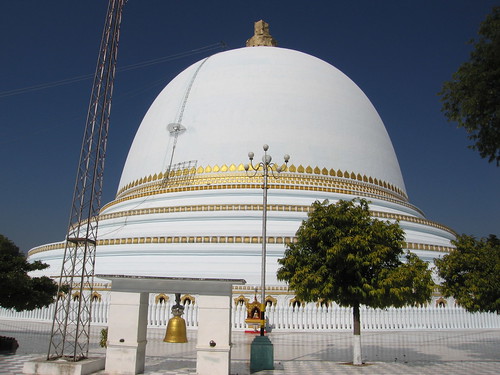
Horse carting around Inwa.
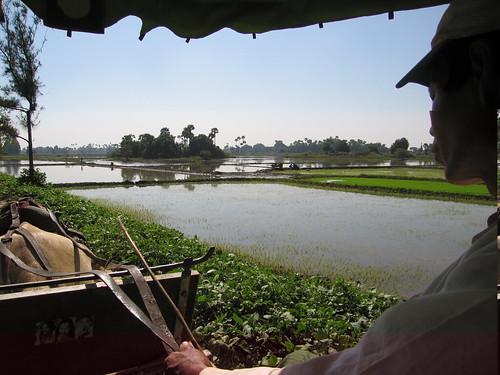
School's in session at the Bagaya Kyaung (Monastery).
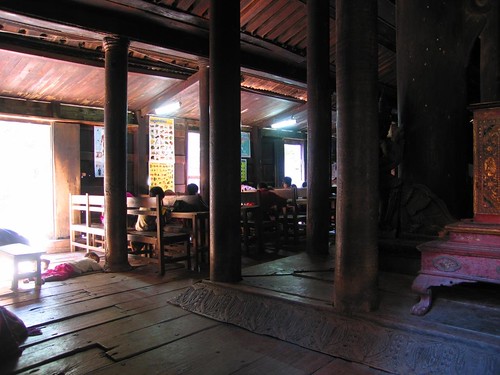
The ferry, the shifty mate, and the Old Ava Bridge in the background.
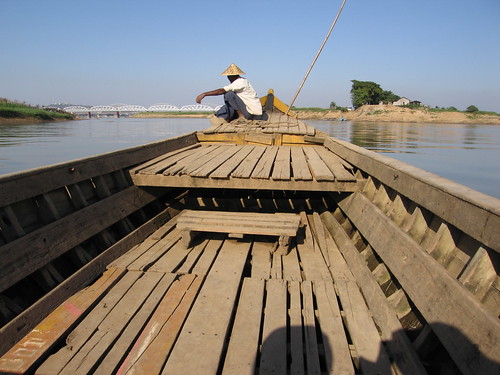
The U Bein Bridge at Amarapura.
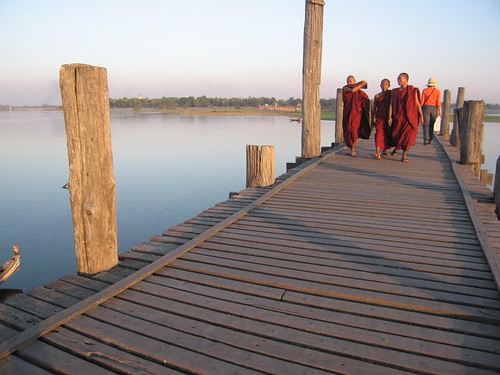
Sunset from the bridge.
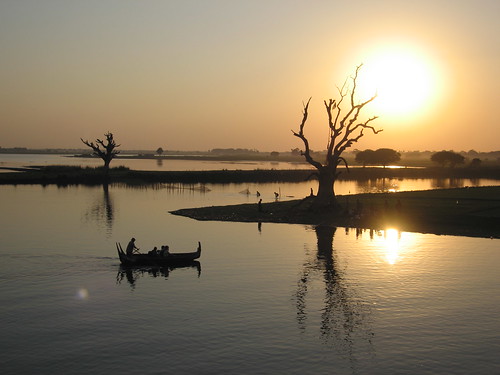
Crossing the Old Ava Bridge.
Sunday, September 28, 2008
Day 4 - January 9, 2008 - Mandalay, Myanmar
"A very productive day even though we were licking our wounds after last evening's accident."
Up at 7:10 and downstairs at 7:45 following some "treatment". Good B-fast. Briefly talked to a young guy from Alabama - a perfect Southern Gentleman - and his German wife.
Decided on plan for next three days
- Today: Mandalay Hill, Palace and surrounding sites by trishaw
- Tomorrow: Three Ancient Cities by blue Mazda taxi at 19,000 Kyat total
- DAT: Shared taxi to Pyin Oo Lwin
Out the door at 9:15 and hired two trishaws (bicycle rickshaw; that is, a bicycle with a side-car) to take us to Mandalay Hill for 3000 Kyat total. It's a nice coolish ride through light AM rush hour traffic to Mandalay Hill going east along 27th following the corners of the Palace Moat.
Arrived a M-Hill about 10 and began the ascent from the SW stairs - the main entrance - leaving our shoes at the bottom for 100 K each.
The entire path up is covered. Makes for good walking year round - rain, shine, cold, heat. And there are benches on the sides of the slopes. Nice. There were vendors selling food that was cooked and packaged and some operating "almost restaurants" with a table or two, chairs, and free tea - full service. ;-). Dogs and cats lay in the sun. A few craftsmen hawking figurines.
There were many shrines and temples on the way up. The guidebooks describe them all. I won't. Sun-Ling liked the big Buddha that points down to the city - not a standard mudra (hand position).
After a leisurely stroll we made it to the top about 11:30, hung out at the top for 30 minutes, enjoyed the 360 view, tried to take a self-portrait, and tended to Sun-Ling's bleeding shin. I sacrificed my bandanna as bandage. Effective for awhile.
There were lots of locals making the trek up, but not jam packed as the sacred hills and mountains in China. Not even close. Families, school girls, families with a monk, guys, girls, and western tourists. One western guy was speaking Burmese - with only a small amount of help from his pocket dictionary - with the locals. Impressive. Wow!
 Bought some snacks and watched a couple of Chinese guys filming themselves making a speech about a hydro-electric project they were working on in Myanmar. They had a local guide/translator with them.
Bought some snacks and watched a couple of Chinese guys filming themselves making a speech about a hydro-electric project they were working on in Myanmar. They had a local guide/translator with them.There is a $10 US fee to visit Mandalay Hill - good for 5 days - and surrounding sites but we were not asked to produce ours or buy one. We did have to pay a 300Kyat camera fee at the top.
The front of the Mandalay Archaeological Zone ticket is ho-hum, but the stamps one gets on the back are way cool.
Stopped on the way down at one of those "almost a restaurants" for 2 bowls of fried noodles + lemongrass soup + fresh tomatoes for 1000 Kyat.
Passed souvenir vendors on the way down selling thanaka wood and stones, T-shirts, and turtle boxes. At one stall, a TV was playing a music video of a Burmese Country and Western song. Unexpected.
Arrived at 6the bottom, retrieved our shoes, and headed on foot to the surrounding sites - all covered by the Mandalay Combo Ticket- in this order:
- Kyauktawgyi Paya
- Kuthodaw Paya
- Sandmuni Paya
- Atumashi Kyaung
- Shwe Nandaw Kyaung
- Mandalay Fort and Palace
Kyauktawgyi Paya
"Relaxing" says Sun-Ling. Cool and shady with 80 surrounding small stupas, each housing an arhat/lohan statue.
Kuthodaw Paya (Known for its 729 tablets of Buddhist scriptures)
On the walk over, two very cute and sharp young ladies about 10 or 12 years old tried to sell us some postcards.
"But I take my own photos."
"Not the same" said the sharper one in good English.
"I will be unhappy if you do not buy my postcards" she continued her spiel.
"You should be in school" I said.
"My family is poor. My mother and father are poor". She rolled her eyes when she said "father" making me think that she meant her father was nuts.
We did not buy any postcards.
Most children in Mandalay seemed to be in school as we often saw them in their uniforms - green longyi and white shirts - headed home for lunch carrying a one strap bag over their shoulders. And as we walked around town we heard young kids in school reciting - shouting - their lessons.
Another aside. Several young business women have asked us "What do you WANT?" which, with the emphasis on "WANT" seems unfriendly to the American ear, but that's just the way it comes out. ;-)
Back to the Kuthodaw Paya. We finally had to hand over the $10 dollars for the combo ticket and we were harassed a bit by the shoe keeper and postcard sellers.
Sandmuni Paya (with more tablets)
A small boy says "Money".
Atumashi Kyaung (Newly built and skippable.)
Shwe Nandaw Kyaung
Another teak temple/monastery/ship. Very cool. Shared the site with a group of French tourists (or maybe Swiss).
Mandalay Fort and Palace
Walked across the moat bridge, had our papers checked, walked down to the oval past Army Band practice to the reconstructed Mandalay Palace. We were both surprised to see houses, small gardens, vendors, and trishaw drivers. We guessed it's the families of soldiers - later confirmed by LP. It was approaching 5:00 PM closing time so we walked up the Watch Tower for some cool views, checked out the reconstructed Glass Palace, had a brief rest and caught 2 trishaws (3000 Kyat) in the rush hour traffic to Nepali Restaurant @ 81st and 26th/27th where we each had a Thali: rice + chapati + curries + soup +beans + refills for 3000Kyat total.
Changed another $100 at Seven Diamond Travel @ 1250 to 1.
Back to RCH. Shower.
SLOTHD: All the small white stupas
JHOTD: Trishaw ride
The Palace Moat with Mandalay Hill in the background.
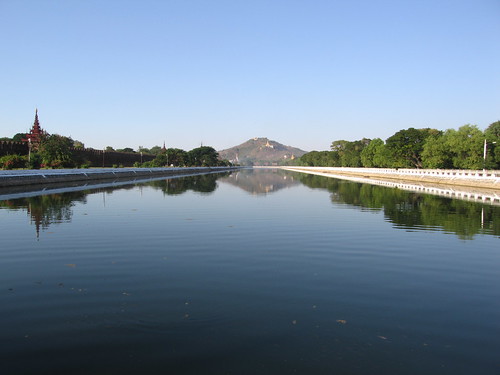
Buddha pointing to Mandalay
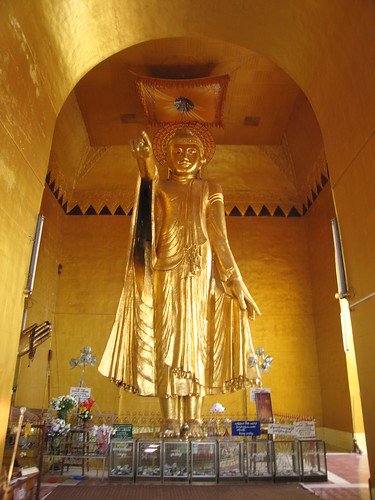
The two of us atop Mandalay Hill.
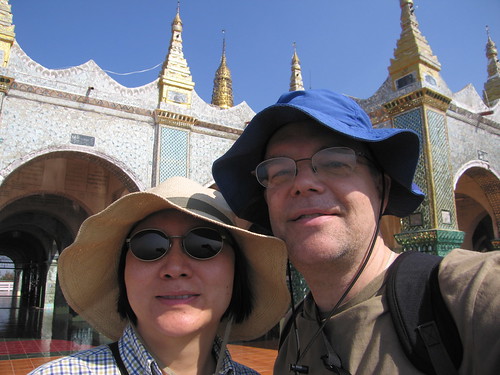
Preparing our lunch.
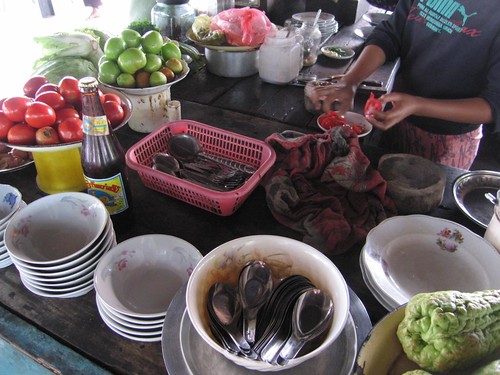
Arhat
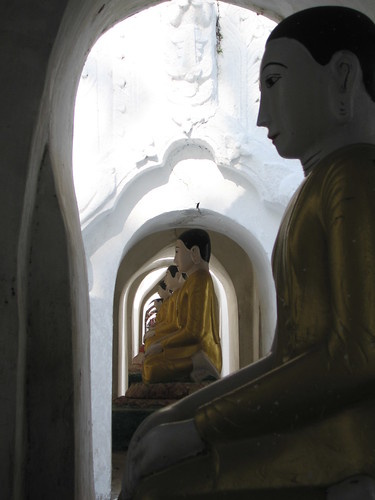
Stupas
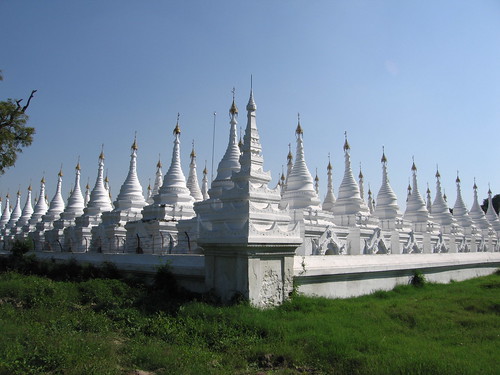
The reconstructed Mandalay Palace.
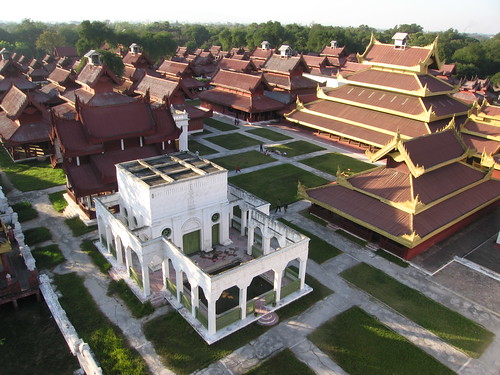
Trishaw driver.
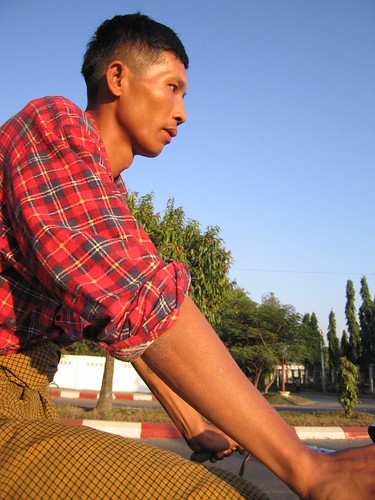
The trishaw ride
Friday, September 26, 2008
Day 3 - January 8, 2008 - Mandalay, Myanmar
"A busy day - best day in Mandalay so far."
"No good deed goes unpunished."
Got going somewhat late, breakfast at 8:30, and decided to rent bikes for the day (1500 Kyat each). I got a big heavy clunker. Sun-Ling got a light hybrid. Perfect for her.
Rode over to the Chinese Consulate at 35th between 66th and 67th. The entrance is down a smaller unpaved road. As we got close I saw a Burmese soldier with a machine gun behind a bank of sandbags. Dismount! We walk by the soldier. He smiles.
A small sign says the consulate is OPEN: 8:30 - 11:30. We went in. The young lady behind the counter speaks English, Chinese, and Burmese. She is Mian Dian Ren - a local. The Chinese word for Myanmar is Mian Dian (緬甸).
After getting info, we decided not to get our China Visa in Mandalay. Too expensive we think... But it later turns out that the cost of a Chinese Tourist Visa went up from $100 to $130 dollars on Jan 20th. So....
Back on the bikes and we headed west on 35th street over the railroad bridge and on to the Irrawaddy River docks. A nice ride on a fairly good road. Most of the smaller roads are a maze of potholes or just poorly paved or a very narrow strip of pavement or all of the above.
Parked our bikes at the jetty and inquired about ferry schedules to Bagan. Our guidebooks said that there is a slow boat every day and a fast boat twice a week. At the fast boat ticket office they told us that the only goes to Bagan when they have a tour group going. Then independent travelers like us can hitch along for a price. The so-called slow boats goes everyday. No decision by us. We will check later with the front desk of our hotel. They seem to have reliable information.
The Irrawaddy River is slowish, greenish, and not inviting.
The jetty is quiet. No goods loading or unloading. No boats arriving or departing. Women are doing laundry and bathing.
Rode back towards town in a SE direction. Small school kids were going home for lunch. They shout "hello' or "hi" and run along with our bikes or wave furiously.
After some navigation we found ourselves by the famous Jade Market which is part workshop and part market. Not impressive.
Then on to the very impressive Shwe In Bin Kyaung, both Buddhist Temple and Monastery. It's a traditional temple built of teak and resembling a on old sailing ship as it stands on silts with broad wooden decks surrounding a wooden temple soaring to the sky like masts and sails. See my photos below.
Not much activity at the monastery grounds. I took a photo of the wooden dinner bell with a carved parrot towards the top. I learned last year that most Buddhist temples and monasteries have a wooden bell that is struck in times of emergency or to summon the monks for dinner. So I'm now trying to amass a collection of photos of these bells. Many of the ones in China are shaped like a fish.
Lunch! Stop at an outdoor place near the kyaung. There is a roof but no walls. It's during the lunch rush. Rice is cooked in big pans and scooped out by hand onto plates and then various curries are added. We have a rice plate with lentils, corn and veggies, plus lemongrass soup, plus hot sauce all round. Very tasty. In addition, an older man is walking around filling up a bottomless salad bowl at each table: carrots, turnips, cabbage, and parsley. All for 600 K - about 50 cents.
Observations on this restaurant:
-Turns out that this type of open-air restaurant is very common all over Burma.
- The toilet was very clean as were almost all the toilets in Burma.
- The patrons were eating with fork or spoon or chopsticks.
Biked around the block with a brief stop at a temple where a Chinese speaking monk tried to be helpful and show us around. He seemed a bit too pushy and we escaped with a "that's too much trouble for you". A couple of men were mediating there.
Then around the corner to the big Monastery south of Shwe In Bin. This was a real monastery. Monks were studying in 4 to 5 buildings. We saw at least one dormitory with shoes and bowls neatly stowed outside. However, as the monks studied, a gang of young women were hauling concrete around to fix the road. We wondered why the monks were not working on the monastery.
Finally we headed south, passing a small factory that makes stone Buddha images, to the most famous temple in all of Mandalay - the Mahamuni Paya.
We entered from the West Gate. A woman vendor motioned that either she would watch our shoes or that our shoes and bikes would be safe. So we left them at her stand. Then down the long dirty corridor to the main temple where the famous Mahamuni Buddha sits covered with 15 cm of gold leaf to the point that he is unrecognizable below the shoulders. Only men can enter the inner sanctum and apply gold leaf. Women sit outside.
It's a very busy place. We only saw three other Western tourists but there many Burmese visitors and vendors. There were bells ringers, and gong bangers, and water pourers. Book sellers, food vendors, fortune tellers, and beggars line the walkways. There were several museums about Buddhism with artifacts, photos of temples, and maps. At one point in the 19th century, and maybe still today, Burma was known as the "Center of World Buddhism".
We returned to our bikes and headed north on 83rd street to 30th where we cut over to 80th and entered the second level of the train station with its confusing "car and bike" ramp over the tracks. We should have entered at ground level on 79th, but after a few minutes Sun-Ling found the ticket office. Inquires were made. Information was written down. No tickets were purchased.
Returned bikes to hotel and walked the 6 blocks or so to "Mann Chinese Restaurant" which had about 15 tables, most filled with men drinking Grand Royal Whiskey mixed with water and ice, and nibbling. Sun-Ling was the only woman in the joint. No Chinese was spoken, but no problem, we had veggie soup + veggie fried rice + veggie fried noddles + 2 x Dagon Extra Strong Beers; all for 6100 Kyat. And we sent a veggie fried rice out to a woman who was sitting on the sidewalk with an infant.
Normally we do not give handouts to beggars as most are professionals, but this young woman looked distressed, had an infant, and had not motioned to us nor bothered us at our table. When the waiter took the food out, the first thing she did was feed the infant, then herself. So probably a good deed. Your run-of-the-mill professional beggars don't need food.
Then, as no good deed goes unpunished, we stepped into a ditch in the darkness on the walk home and got fairly banged up, John on his left palm and right shin, Sun-Ling on the right shin. She would bleed a bit for several days and not heal completely for weeks. But it could have been worse - broken bones - so we felt lucky.
SLHOTD: bike ride
JHOTD: temple like a ship
Ferry moored at the docks.

Shwe In Bin Monastery - the decks.
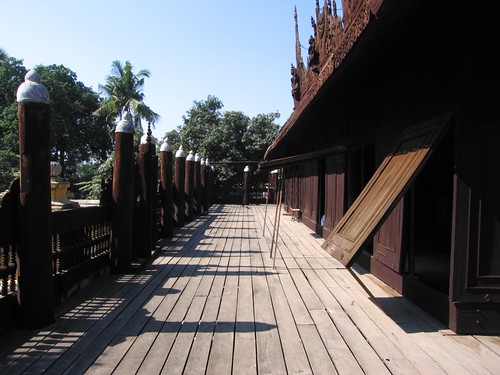
Shwe In Bin Monastery - the masts and sails.
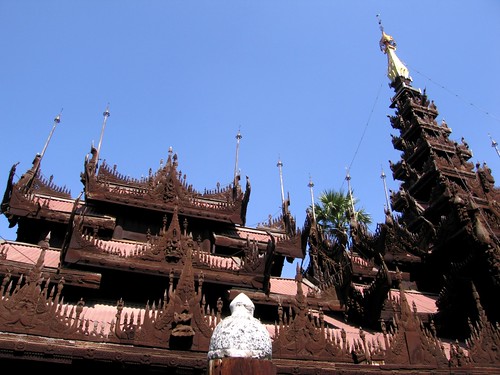
Remnants of lunch.
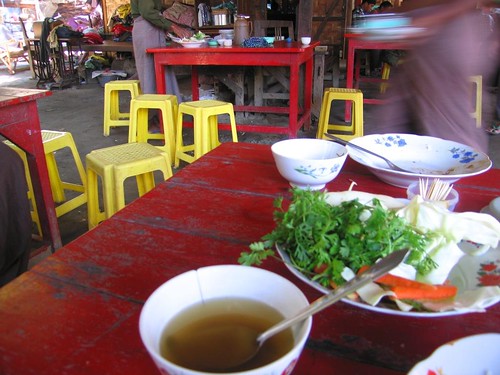
Young women hauling concrete.
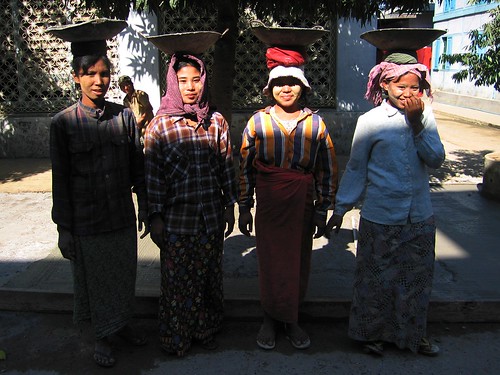
Monk Dormitory with shoes and wash bowls and robes.

A horsecar passes in front of the Gem Market.
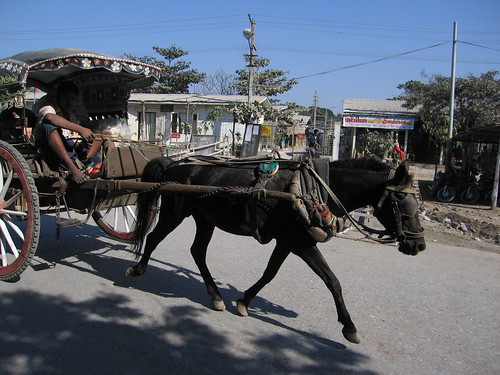
The Maha Muni (Great Sage) Buddha.
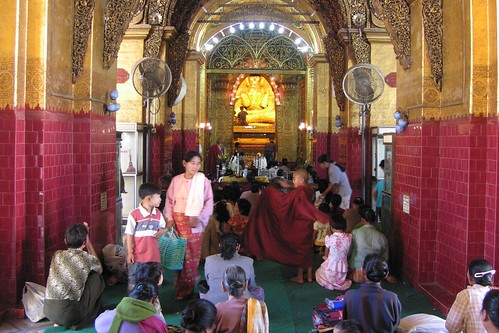
Wooden Drum with bird carving.
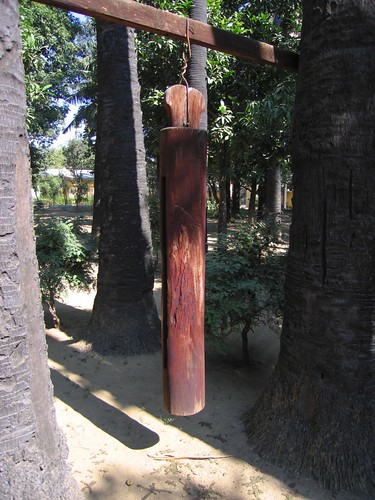 a>
a>
Most Recent Post
Brazil: Paraty
Paraty is a colonial town between Sao Paulo and Rio, therefore very popular. Founded to ship gold mined from Minas Gerais, Paraty took a bac...

Most Popular Posts of Last 30 Days
-
From Paramaribo we headed to the Northern Pantanal Wetlands, at the top of our Brazil itinerary, a place that wasn't even on our radar b...
-
When Indigo airlines canceled our Colombo-Hyderabad flight, we took India and Pakistan off our itinerary. Considering we are in the 10th yea...
-
On our way down to Brazil we originally had ambitions of bagging all three Guianas: Guyana(former British), Suriname(Dutch), and French Guia...
-
From Yining, China, we began a somewhat difficult two-day journey to Karakol, Kyrgyzstan via Zharkent, Kazakhstan. The easy route would hav...
-
From the Pantanal, we flew to our other major destination, Iguazu Falls. We spent the first day visiting the falls from the Brazil side, and...
-
John says: The Pantanal Boat Tour from Porto Jofre exceeded our expectations and deserves its own post. We pushed off from the dock at 7:15 ...
-
Back in February when I was looking for tickets to return home from Australia, I found the cheapest route was through Honolulu, a place that...
